Guest Author Blog: Know Your Gig by Andy Boynton and Bill Fischer, with William Bole authors of, THE IDEA HUNTER: How to Find the Best Ideas and Make them Happen
Recent surveys have found that managers are increasingly worried about information overload – and no wonder. Every day they face another deluge of email as well as data from other sources including social media, much of which is irrelevant to their professional goals.
Managers and executives have gone looking for technological solutions to this challenge – for example, better ways of aggregating and filtering their data. This is all well and good, but there’s an entirely different way to think about how to whittle down the knowledge that surges our way.
The basic problem is not that there’s too much information out there. It’s that most of us don’t have a clear-enough idea of what we’re looking for – which sources of information will add distinct value to our projects, careers, and organizations.
What we all need is a general filter that translates the world surrounding us into ideas that matter. And that particular filter is in your head, not in your software. We call it The Gig.
By that we do not mean what a musician does on a Saturday night. We’re talking about an awareness of what you’re all about as a professional and where you want to be going in your career and projects. Without a general sense of purpose and goals, you won’t know what ideas you're hunting for, and you'll be defenseless against the demons of information overload.
Walt Disney had a gig. His goal was to create entertainment for the whole family, whether through amusement parks like Disneyland or animated films like Fantasia. There are similar passions and purposes to be gleaned from every celebrated idea hunter's story.
Henry Ford's gig was to create a car for everyone. To do that, he and the Ford Motor Company had to refashion the process of manufacturing and create assembly lines. Warren Buffett's distinction, apart from his piggy bank, is that he took a different tack on investing than his colleagues. He has sought to understand the fundamentals of a company rather than try to predict the ups and downs of the market.
"A crucial part of knowing your gig is to understand your circle of competence – what you're good at.""
Those icons knew their gigs. And the salient point is that their gigs gave focus and direction to their learning and idea hunting.
Disney did not go looking for his best ideas in the thrill-ride American amusement parks of his time, which were seedy places with bad food and unfriendly employees. He traveled to Denmark instead, to observe the scene at Tivoli Gardens in Copenhagen, a clean and orderly park with lush flowers and a festive family atmosphere. This mission of multi-generational entertainment continues to animate the company that bears his name .
Buffett doesn't pass his days staring at the ticker tape or conjuring up ways to game the market. He sets his mind to learning whatever he could about a specific firm or industry. That serves his goal of finding stocks that sell below the real worth of the company.
A gig is not defined by a line of work, much less by a job title.
A product developer's gig is not product development; rather, it might be to encourage the free flow of ideas in a unit or organization, to help build a culture of conversation. A sales associate's gig is not sales; it might instead rest on a capacity for empathy, a talent for getting beneath the surface and understanding a company's needs.
A crucial part of knowing your gig is to understand your circle of competence – what you're good at.
For example, Buffett is well known for steering clear of high-tech stocks; he says he has no business in that arena because he doesn't understand it. "If we have a strength," Buffett has explained, referring to his company Berkshire Hathaway(BRK.A), "it is in recognizing when we are operating well within our circle of competence and when we are approaching the perimeter." This takes Buffett and long way toward figuring out what he should be doing – and where he should be looking for information and ideas.
How do you discern your gig? Understanding what you're good at (or would like to become good at) is one requirement. It also helps greatly to reflect on your passions and purposes as well as to always think about the customer. Is there a market for what I want to be doing? Does anyone really need me to know the information I'm tracking down at this moment?
The gig is a compass. It helps guide you in your ongoing search for information and ideas. Know your gig, and you will be loaded, but not overloaded, with the information you need.
Andy Boynton is Dean of the Carroll School of Management at Boston College. Bill Fischer is a professor at IMD (International Institute for Management Development) in Lausanne, Switzerland. They are coauthors, with William Bole, of The Idea Hunter: How to Find the Best Ideas and Make Them Happen (Jossey-Bass, 2011).
Email me at bullishonbooks@cnbc.com — And follow me on Twitter @BullishonBooks



